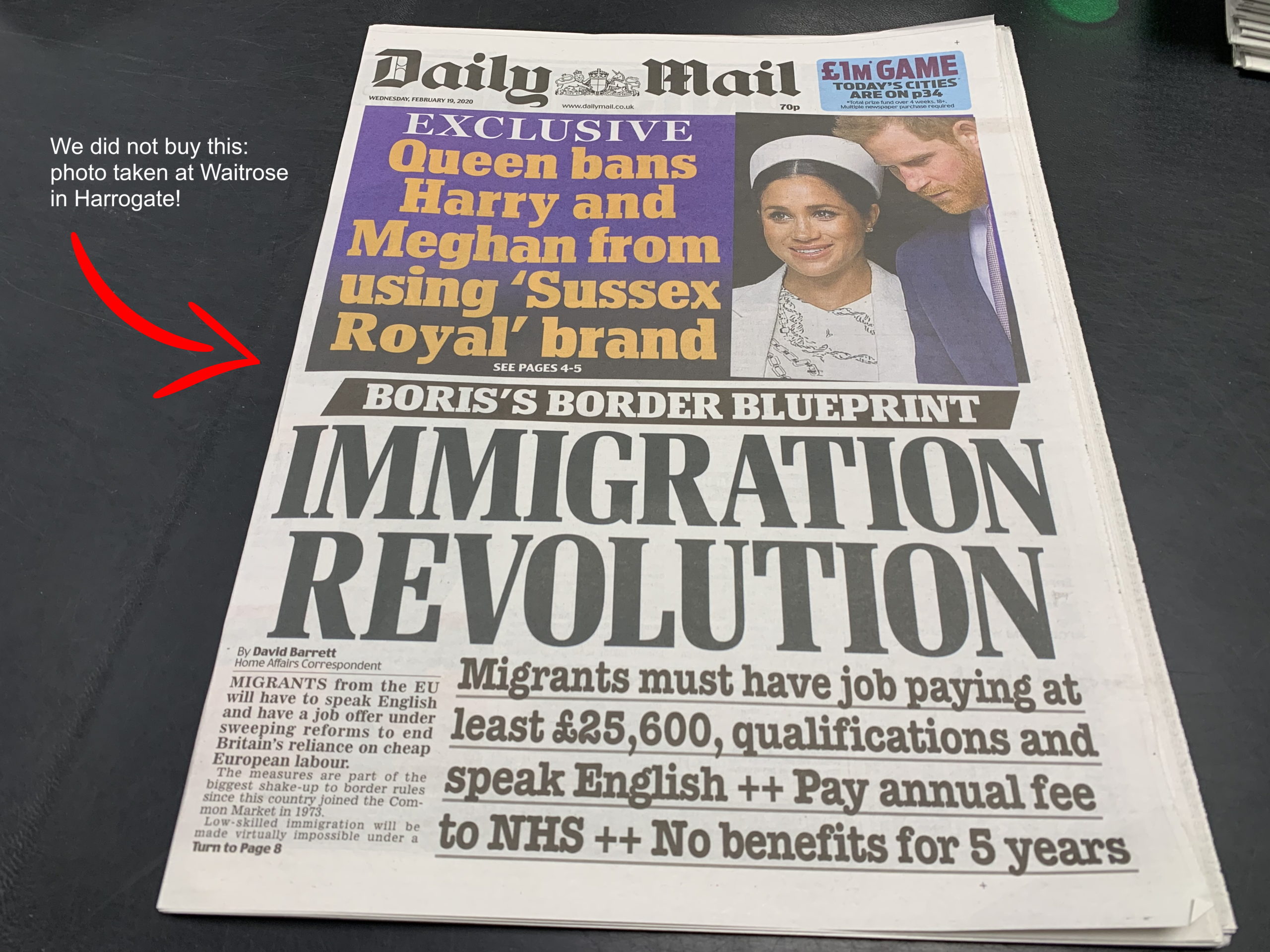Today, the government introduced a policy statement outlining how the UK’s immigration policy will take shape from 2021. Today’s Daily Mail ran the headline ‘Immigration Revolution’, with the sub-headings ‘Migrants must have job paying at least £25,600, qualifications, and speak English ++Pay annual fee to NHS ++No benefits for 5 years’.
We knew that free movement would cease at the end of the year, a consequence of Brexit and the transition period expiring. But whilst the EU labour-tap is tightened, the government is set to operate a series of levers to potentially increase the general flow of immigration, by lowering the minimum skill and salary requirements and by removing the cap on the number of migrants who can come as sponsored workers.
The Daily Mail is increasingly overt in its championing of Conservative policy, and hardly known for nuanced reporting on immigration matters, yet variations of the above themes can be found in multiple media and government sources.
Here I will examine some of the key aspects of the new immigration policy, by addressing in turn the claims made in the Daily Mail sub-headlines, and consider to what extent the measures highlighted by the Daily Mail can be considered part of an Immigration Revolution, or even true for that matter.
‘Migrants must have job paying at least £25,600’
To start with, it is not accurate to simply say that migrants will have to be paid at least £25,600 under the new system. To give a bit more detail, £25,600 will indeed be the new general minimum salary threshold for ‘experienced workers’, although as with the present system, workers will need to be paid more if the ‘going rate’ for any specific job is higher than the threshold.
However, the Daily Mail’s sub-headline does not capture the fact that people who are not ‘experienced’ face a significantly lower minimum threshold.
In current parlance ‘new entrant’ is a category for certain people, including international students switching into employment, or individuals aged under 26, and this ‘new entrant’ definition looks set to be retained. The minimum salary threshold for new entrants is reportedly going to be 30% less than the experienced rate, which by my calculation makes £17,920. A lot less than £25,600.
Furthermore, even ‘experienced’ worker positions can be paid less than £25,600 if they can (in Home Office words) ‘trade’ certain characteristics of the job for a lower salary of just £20,480. Jobs on the Shortage Occupation List, or individuals with a PhD in a STEM subject relevant to their job can be paid at the lower rate of £20,480.
The DM sub-headline also implies this new threshold is a stricter rule. In fact, the new minimum salary thresholds are significant reductions compared to the current levels of £30,000 for an experienced worker and £18,600 for new entrants.
Verdict: Highly misleading. It is wrong to simply state that jobs must be paid at least £25,600, given the significantly lower minimum salary level for new entrants and exemptions for Shortage Occupation and STEM jobs. And of course, the Government Daily Mail does not trumpet the fact these thresholds are coming down.
It is correct that, for EU nationals, they face a new and considerable restriction: previously EU nationals could work as little as 10 hours per week on minimum wage and still be classed as ‘workers’, thereby residing here legally.
However, the most recent Office for National Statistic data shows that net migration of EU nationals stands at 48,000 and has been falling for years. EU migration is now dwarfed by non-EU migration, which stands at 229,000, with the rate of net migration of non-EU nationals rising sharply in recent years. Non-EU migration is nearly four times higher than EU migration and thus the vast majority of migrants will face lower thresholds under the new system.
‘Qualifications’
This sub-headline suggests a new requirement that migrants must hold certain qualifications under the new system. This seems misleading as, apart from a few niche immigration categories which will cover relatively few migrants, there seems to be no new requirement to have any qualification.
Under the current system for skilled workers, known as Tier 2 General, with a few exceptions only jobs at degree level or above can be sponsored. The key here is the classification of the job as degree level: there is no requirement that the individual possess a particular qualification (apart from English, which is dealt with separately).
It is true that there is set to be an expansion of what used to be called the Exceptional Talent route, now rebranded as Global Talent. Under Global Talent, and also under a new, soon-to-be-announced route, the ‘most highly skilled individuals’ can enter without a job offer. These individuals will be required to hold advanced qualifications, but by the government’s own admission these people will be a ‘smaller number’.
Most migrant workers will therefore continue to require sponsorship and there is no indication that they will need to hold a particular qualification in the future.
Not only are qualifications not generally required, but a major change of the new system will see a significant reduction in the skill level of jobs capable of sponsorship. From 2021, the types of jobs which are capable of sponsorship will lower dramatically, from jobs recognised at degree level to jobs recognised at A-level and above.
Verdict: Demonstrably false. For the vast majority, advanced qualifications are not mandatory and in fact, under the new system, lower skilled jobs can now be filled by migrants.
‘Speak English’
Both the DM and the Home Secretary have made much of the requirement to speak English under the new system, suggesting that under the current system there is no requirement for workers to satisfy an English language requirement.
Whilst it is true that there is currently no English language requirement for EU nationals, non-EU nationals are almost always required to satisfy an English language requirement. They do this by either being from a recognised majority English speaking country, having a degree taught in English or by passing an English language test from an approved Home Office test provider.
Verdict: Pretty misleading. Whilst EU nationals will in the future need to satisfy the English language requirement, most new arrivals from outside the EU already have to satisfy the English language requirement.
‘Pay annual fee to NHS’
The Immigration Health Surcharge is a levy for all non-EU nationals coming to stay in the UK for more than 6 months and allows people to access to the NHS. On 8 January 2019 the levy increased to £400 per year.
Whilst it is true that EU nationals will in the future have to pay the Immigration Health Surcharge, the vast majority of new arrivals already have to pay the charge [can you see a pattern developing here?].
Verdict: Pretty misleading.
‘No benefits for 5 years’
The current position for non-EU nationals is that they cannot claim public funds until they obtain indefinite leave to remain. Under present immigration routes, including coming as a family member of a British person or coming in a work-based capacity, the earliest a person can obtain indefinite leave to remain is after residing in the UK for five years.
The current position for EU nationals is a bit more complicated. Ignoring for a moment EU nationals who have Settled Status or Permanent Residence, as they will have normally have already resided in the UK for five years, other EU nationals can in fact claim benefits if they have a right to reside here, which includes being a worker, job-seeker or if you have just moved to the UK.
Under the EU Settlement Scheme, those who have not accrued five years’ residence in the UK will likely qualify for Pre-Settled Status. The law does not exclude people with Pre-Settled Status claiming benefits and this will not change in light of today’s announcement.
Verdict: Highly misleading and scaremongering.
Non-EU nationals are already prevented from claiming public funds. Nothing will change the entitlement of EU nationals and their non-EU family members to claim public funds.
Overall Verdict:
The impression that the Daily Mail, and the Government, is trying to create is that this is a revolutionary and tough new immigration system, doing away with low-skilled workers, with a view to driving up wages.
The system certainly will become much ‘tougher’ for new EU arrivals and their family members, but, these people now represent a small proportion of new arrivals.
What seems to be happening is that the system for non-EU nationals is effectively being liberalised, by lowering the skill level, salary threshold and removing the ‘cap’ on the number of sponsored workers that can come to the UK. This more generous system is then being expanded to cover EU nationals.
Given that non-EU nationals now vastly outnumber EU nationals, in terms of new arrivals, it seems a prudent move by the Government to move away from ‘targets’, as these reforms might well lead to an overall increase in net migration. That is not to say this is a bad thing, but the rhetoric as ever seems misplaced.
For expert immigration advice, please contact me at louis@truthlegal.com or call 01423 788538.
Further Reading
From one of the UK’s most read legal blogs.

















